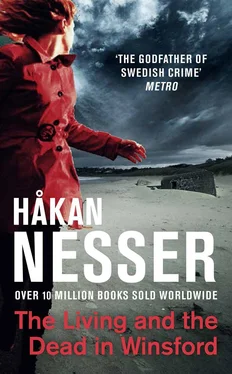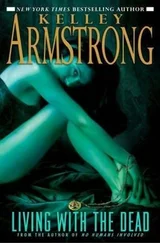Håkan Nesser - The Living and the Dead in Winsford
Здесь есть возможность читать онлайн «Håkan Nesser - The Living and the Dead in Winsford» весь текст электронной книги совершенно бесплатно (целиком полную версию без сокращений). В некоторых случаях можно слушать аудио, скачать через торрент в формате fb2 и присутствует краткое содержание. Год выпуска: 2013, Издательство: Mantle, Жанр: Криминальный детектив, на английском языке. Описание произведения, (предисловие) а так же отзывы посетителей доступны на портале библиотеки ЛибКат.
- Название:The Living and the Dead in Winsford
- Автор:
- Издательство:Mantle
- Жанр:
- Год:2013
- ISBN:нет данных
- Рейтинг книги:4 / 5. Голосов: 1
-
Избранное:Добавить в избранное
- Отзывы:
-
Ваша оценка:
- 80
- 1
- 2
- 3
- 4
- 5
The Living and the Dead in Winsford: краткое содержание, описание и аннотация
Предлагаем к чтению аннотацию, описание, краткое содержание или предисловие (зависит от того, что написал сам автор книги «The Living and the Dead in Winsford»). Если вы не нашли необходимую информацию о книге — напишите в комментариях, мы постараемся отыскать её.
The Living and the Dead in Winsford — читать онлайн бесплатно полную книгу (весь текст) целиком
Ниже представлен текст книги, разбитый по страницам. Система сохранения места последней прочитанной страницы, позволяет с удобством читать онлайн бесплатно книгу «The Living and the Dead in Winsford», без необходимости каждый раз заново искать на чём Вы остановились. Поставьте закладку, и сможете в любой момент перейти на страницу, на которой закончили чтение.
Интервал:
Закладка:
In addition to the handwritten and typewritten material I eventually found a file on Martin’s computer entitled Taza , and as I knew that he didn’t start using a computer until the beginning of the nineties I assumed — without opening the file — that it comprised fair copies of earlier pages, or something he had written later. I didn’t find any other documents that seemed to deal with those summers, and didn’t bother to look any further into that particular aspect.
Now that I had acquired a certain degree of familiarity with the material, I immediately started to feel distinctly sceptical about the project as a whole. What was the point? What was I going to get out of it? What would anybody get out of it? Wouldn’t it be better if I spent all my time reading Dickens instead? Or something else, goodness only knows what. Surely I could deal with Bergman in some other way when it became relevant? In so far as there was any point in considering a future. I let Castor out for the evening’s last peeing session, and poured myself a glass of port to help me reach a conclusion.
In the end I decided to take the first of the diaries for bedtime reading. As a trial, without committing myself to continuing along those lines, but to give it a chance even so. Perhaps I thought I owed him that in a way, maybe it had something to do with the unhealthy feminine efficiency we women are alleged to have: but I’m quite sure this would not be a truthful description of my motives. Let’s face it, one tells lies mainly for one’s own peace of mind.
The first obvious problem I came upon was Martin’s handwriting. I had been used to it for over thirty years, but sometimes that didn’t help. I also know that he himself had difficulties at times in understanding what he had written, especially if it was something he had just scribbled down hastily in a notebook or on a loose scrap of paper. In his diary of the stay in Samos, 1977, it was obvious that he had made an effort to write neatly or at least legibly in the beginning, but after a few pages it was impossible to read some words, even when one considered them in context.
Besides, it was all rather uninteresting — I couldn’t help but feel that. The date, getting up, breakfast, the weather, conversations with somebody or other. A walk, a swim, an attempt to describe nature. Name-dropping — there was a distinct whiff of that, even if the people concerned were not anybody I knew about, apart from Hyatt and Herold, and he rarely talked to them, not in the first week at least. And he only refers to them from a distance, as it were. ‘Bessie sat in the shade of the plane tree all morning, writing.’ ‘Tom went off in the boat and there was no sign of him all day. He came back at dusk with a dozen reddish fish.’ It is noticeable that he admires them, especially him. In the summer of 1977 Bessie Hyatt’s sensational debut novel hadn’t yet appeared — if I remember rightly, that is: I think it came out in the autumn or the winter of that year — but Tom Herold was already a sort of icon. Comparisons with the likes of Byron were not uncommon. Somewhat jokily (one assumes) Martin describes him as ‘The Childe Herold of our time’, and it is presumably not just the similarity in the name he is referring to.
He also describes the practicalities of life in the collective. They sleep on simple mattresses lying on the floor in a large building with about a dozen small rooms: that fits in with what Martin told me when we first met. A shared shower room, shared toilets — he thinks the building had previously been used by the military, and as some kind of children’s home or children’s holiday camp. The house that Herold and Hyatt live in was evidently where the permanent staff used to live, or people with varying leadership status. It is situated some distance away on a hill, and the famous couple apparently tend to keep themselves to themselves — there is no mention as yet of going to visit them in their home. For all the others there is a large shared kitchen and also a taverna a couple of hundred metres away by the road leading down to the beach. He mentions the rent: apparently they pay Hyatt and Herold a few hundred drachmas a week via somebody called Bruno. A paltry sum, according to Martin.
He also writes that Finn hasn’t yet arrived, although he had promised to spend the whole summer there. I know that Finn is Finn Halvorsen, a Norwegian and a good friend of Martin’s — and in fact the person who had told him about the notorious collective, and invited him to stay there.
But there is not much in the way of reflections at the beginning of the diary: not pregnant reflections, at least. As I read it I have the impression that Martin feels somehow overwhelmed, despite the fact that he is leaning over backwards to avoid revealing that. By the place itself: the blue Mediterranean, the white beaches, the cypresses, the scent of thyme — but perhaps above all by the people surrounding him: free-thinking hippies and citizens of the world, young men and women who seem to lead a voluntary and unrestrained bohemian existence in the classical Greek island setting without thinking that what they are doing is in the least remarkable. That they seem to have a right to it .
And they are all writers of one kind or another. Or practitioners of the liberal arts, at least. Two women — he assumes they are a lesbian couple but never says what they are called — stand up on the hill every morning, painting. ‘Until the midday sun forces them down to the sea, or indoors. They are half-naked all the time.’
Eroticism? I think. A place like that must have reeked of eroticism.
But Martin prefers to comment on the conversations. ‘Sat and chatted to Hernot and Della for a few hours,’ he writes. ‘About hermeneutics and Sartre. Bons came and joined in: he must be the most cheerful Nietzschean I’ve ever come across, but he’d been smoking too much weed and fell asleep after a while.’
The most cheerful Nietzschean I’ve ever come across ? It’s not difficult to get the impression that he’s writing to impress somebody. Himself, presumably; or maybe some woman who in future happens to glance at the book which he has left open in front of her on their first date, apparently by accident. I remembered that in the summer of 1977 I hadn’t yet met Martin at that garden party in Gamla Stan in Stockholm. The summer of 1977 was when Rolf fell over a cliff above Flüeli in Switzerland, and died.
At another point — it’s the fifteenth of July and he’s been on Samos for just over a week — he writes:
Two new members arrived at the collective today. A German and a Russian, remarkably enough. The German is a poet and is called Klinzenegger [I’m unsure about the spelling here, we’ll see if he’s mentioned again later on], the Russian is called Gusov but is careful to point out that this is only his pseudonym. We had lunch together at the taverna — Elly and Barbara as well — just the usual Greek salad and a few glasses of retsina, of course, and it transpired that Gusov has been living in Greece on and off for several years, and among other things has been active in the struggle against the military junta. Claimed he spent several months in prison on that account, but that he was released when it was all over in 1974. I think he regards himself as a sort of honorary Greek citizen on the basis of his efforts. He also speaks quite fluent Greek with Manolis as the meal is being served. But unfortunately he sounds rather cocksure of himself. Too much preaching. And a shaggy mass of beard as befits a revolutionary and resistance fighter. I tried to talk to him about Mayakovsky and Mandelstam, but he didn’t seem interested. Presumably didn’t have anything much to say about them.
I yawned and checked the time. It was a quarter to one. I registered that even if the overall total was only five hundred pages, I had so far read a mere three per cent. I felt tired out, put the book down and switched off the bedside lamp.
Читать дальшеИнтервал:
Закладка:
Похожие книги на «The Living and the Dead in Winsford»
Представляем Вашему вниманию похожие книги на «The Living and the Dead in Winsford» списком для выбора. Мы отобрали схожую по названию и смыслу литературу в надежде предоставить читателям больше вариантов отыскать новые, интересные, ещё непрочитанные произведения.
Обсуждение, отзывы о книге «The Living and the Dead in Winsford» и просто собственные мнения читателей. Оставьте ваши комментарии, напишите, что Вы думаете о произведении, его смысле или главных героях. Укажите что конкретно понравилось, а что нет, и почему Вы так считаете.












